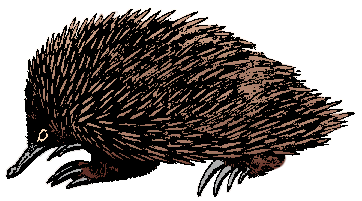Illustration of echidna

| 单词 | echidna |
| 释义 | echidnanoun echid·na i-ˈkid-nə : a spiny-coated toothless burrowing nocturnal monotreme mammal (Tachyglossus aculeatus) of Australia, Tasmania, and New Guinea that has a long extensible tongue and long heavy claws and that feeds chiefly on ants also : a related mammal (Zaglossus bruijni) of New Guinea having a longer snout and shorter spines |
| 随便看 |
英语词典包含469781条英英释义在线翻译词条,基本涵盖了全部常用单词的英英翻译及用法,是英语学习的有利工具。